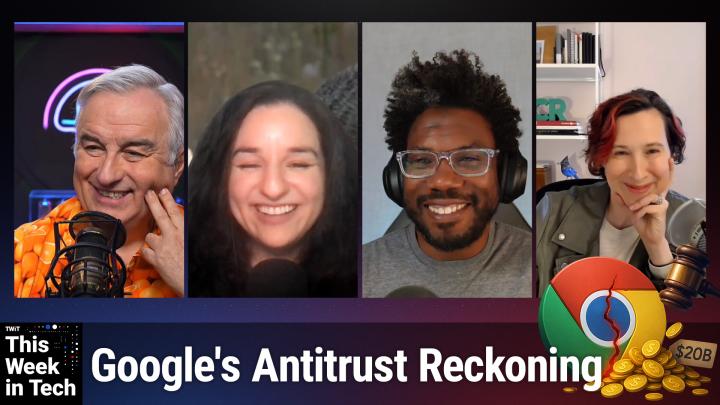Chrome for Sale? Google's Antitrust Remedies
AI-generated, human-reviewed.
The tech industry is facing unprecedented antitrust scrutiny, and Google finds itself at the center of it all. In a recent episode of This Week in Tech, Leo Laporte and guests Shoshana Weissmann, Wesley Faulkner, and Stacey Higginbotham dove deep into the implications of Google's monopoly rulings and what the proposed remedies could mean for the tech landscape.
The Current State of Google's Legal Troubles
Last year, Google was found guilty of monopolistic behavior in two separate cases - one involving search dominance and another focusing on advertising. The search case has particularly caught attention as Judge Mehta now faces the difficult task of determining appropriate remedies, with a decision expected in August of this year.
The DOJ is pushing for one of three major remedies: forcing Google to sell Chrome, licensing out its search data to competitors, or stopping the $20 billion annual payments to companies like Apple for default search placement. These proposals have sparked intense debate about their feasibility and potential consequences.
The Panel's Perspectives
Wesley Faulkner expressed skepticism about the proposed solutions, questioning practical aspects like whether a Chrome sale would include ChromeOS and pointing out the inherent challenges of selling an open-source project. He offered an alternative approach: setting a market share cap of around 80% and allowing Google to choose how to achieve that target, whether through investing in competitors or reducing anti-competitive practices.
Stacey Higginbotham acknowledged the complexity of the situation, noting how disruptive changes to the ecosystem would inevitably "break some eggs." She felt frustrated that the focus wasn't on the advertising monopoly, which she views as potentially more problematic than search dominance. She also raised concerns about how proposed remedies like stopping payments to Firefox could inadvertently harm one of the few remaining browser alternatives.
Shoshana Weissmann brought a broader critique of American antitrust enforcement, arguing that courts often act too late and propose remedies that don't make practical sense. She pointed out the irony of these actions coming just as AI search tools are beginning to challenge Google's dominance, potentially making the timing particularly poor.
The AI Factor
The discussion revealed an interesting paradox: just as regulators are moving against Google's search monopoly, artificial intelligence is fundamentally changing how people search for information. Several panelists admitted they're increasingly using AI tools instead of traditional search engines, raising questions about whether these antitrust actions are addressing yesterday's problem.
However, concerns about AI's data collection practices emerged as equally troubling. AI systems appear to have even more persistent memory than traditional search engines, storing detailed profiles of users that can't be easily cleared like browser cookies.
Broader Implications for Tech Regulation
The conversation expanded beyond Google to examine the cyclical nature of tech regulation. The panelists noted how antitrust enforcement tends to lag behind technological change, often addressing monopolies just as new challenges emerge. They drew parallels to historical cases like Microsoft's browser bundling and IBM's mainframe dominance.
A particularly interesting dynamic emerged around the political nature of enforcement, with different administrations taking varying approaches to tech regulation. The current environment suggests that while specific targets may change with administrations, the overall trend toward increased scrutiny of big tech appears to be growing.
Looking Forward
The challenge facing Judge Mehta is enormous - crafting remedies that effectively address monopolistic behavior without creating unintended consequences or stifling innovation. The proposed solutions raise fundamental questions about how markets should function in an era of platform dominance and AI disruption.
As Wesley suggested, perhaps the solution lies not in breaking up companies but in creating market dynamics that reward competitive behavior. Stacey's reference to the Herfindahl-Hirschman Index and market concentration metrics points toward more sophisticated regulatory approaches that could account for the nuances of digital markets.
The discussion highlighted how traditional antitrust thinking struggles with modern tech ecosystems where free services are exchanged for data, network effects create winner-take-all dynamics, and the pace of innovation can quickly reshape entire markets.
The Bottom Line
Google's antitrust troubles represent more than just one company's legal challenges - they're a litmus test for how society will regulate technology companies in the digital age. The outcome will likely set precedents for how we balance innovation, competition, and consumer protection in an increasingly connected world.
Whether Judge Mehta's decision will effectively address Google's monopoly power or create new problems remains to be seen. What's clear is that the tech industry is undergoing a fundamental reckoning, and the decisions made in these cases will shape the digital landscape for years to come.
Want to hear the full discussion and more insights from the tech world? Listen to the complete This Week in Tech episode. Don't miss out on the deep dives into tech policy, AI developments, and the conversations that are shaping our digital future.
